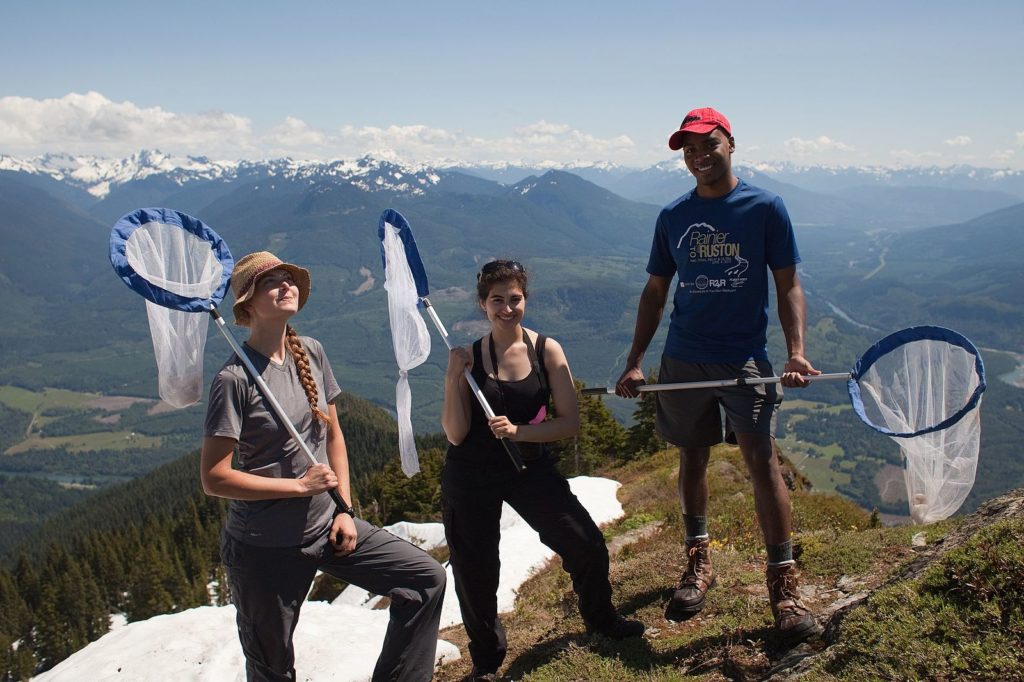Have you ever dreamed of becoming a scientist, but found yourself on another life path? Are there young people in your life who are curious about STEAM? Do you want to make a contribution towards bettering the world, but you’re not quite sure where to begin? If so, citizen science might be the best tool for you to expand your knowledge base while engaging in relevant modern research.
Citizen science is a practice in which members of the public voluntarily participate in the scientific process to address real world questions and concerns.
There are many definitions of citizen science, and even more types of projects, but all of them share commonalities. According the citizen science website SciStarter, four common features of citizen science are:
- anyone is eligible to participate
- participants use the same protocol so data can be combined and be high quality
- data can help real scientists come to real conclusions
- a wide community of scientists and volunteers work together and share data to which the public, as well as scientists, have access
There are a few more similarities between citizen science projects. Often, these projects utilize crowdsourcing, and embrace the potential for public education and citizen agency.


Crowdsourcing
Citizen science relies on non-professional scientists (citizens) to contribute to the project or research. This is sometimes known as “crowdsourcing.” SciStarter points out that public involvement typically features data collection, analysis, or reporting. Participants may record notes about local wildlife, use test kits to monitor water quality, or measure light pollution with their smartphone. Lead scientists and subject matter experts often design the project and provide insight into findings, but the role of the citizen scientist is invaluable. Widespread volunteerism allows scientists to collect a broad scope of data that they otherwise would not have the funding or people-power to compile.
Public Education
Critics of citizen science have questioned whether this use of unpaid citizen labor is exploitative, but the ultimate goal of most citizen science projects is to involve the public in research that is both fun and educational. Citizen science provides participants with a chance to learn about the scientific process, and implement it, in both formal and informal education environments. A 2018 study from the National Academies of Science, Engineering, and Medicine on “Learning Through Citizen Science” found that: “With careful planning, intentional design, and learning supports, citizen science can:
- amplify participants’ identities as individuals who contribute to science and support their self-efficacy in science
- provide an opportunity for participants to learn about data, data analysis, and interpretation of data, and
- provide a venue for participants to learn about the nature of science and scientific reasoning.”
These learning opportunities are not only valuable for participants. A focus on public education can help ensure that citizen science projects come away with unbiased and accurate data. The “Learning Through Citizen Science” study also found that “helping participants develop and practice the skills associated with data collection improved the quality of data collected, which is good both for science and the communities who base subsequent action on that data.”
Citizen Agency
This brings us to another facet of citizen science: that citizen science projects can and should instill a sense of agency in citizen participants. Projects may be local or global in nature, but most will focus on topics that citizens care about, whether it’s a worldwide issue like climate change or a regional concern like air quality in their neighborhood. Participating in the science surrounding these matters is a way for citizens to take action. This is particularly effective if the data can influence policy making that directly affects the citizen and their environment.
No large-scale study has been conducted to prove the importance of citizen agency, but many studies have agreed that this is one potential benefit. A 2020 study of a citizen science program on malaria control suggested: “A [citizen science project] has potential not only as a means of collecting a large amount of citizen science data, but also equally important, as a means of engaging citizens in decision-making and solving environmental and public health problems.”
Where and How to Find Citizen Science Projects
If you’re interested in participating in a citizen science project, there are plenty of resources to help you get started. You can use a search tool like SciStarter or CitizenScience.gov to find a project happening online or near you. Both of these search tools allow you to filter projects to find one that suits your interests.
The Eclipse Soundscapes Citizen Science Project
The Eclipse Soundscapes Citizen Science Project will call on citizen scientists to collect audio recordings of soundscapes before, during, and after total solar eclipses. These recordings may help us better understand how astronomical events affect life here on Earth. Citizen scientists will be called to participate in 2023. To stay up to date with project details, join our mailing list.
